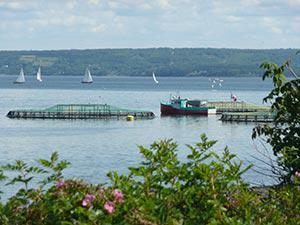You are here
Re: Public Consultation on regulatory framework for aquaculture industry

Here is an excellent letter by Peggy Cameron about aquaculture in NS that she submitted to the Nova Scotia Aquaculture Regulatory Review Panel, established by The Nova Scotia Department of Fisheries and Aquaculture.
Peggy Cameron won the environmentalist of the year award for Nova Scotia two years ago. She is the Vice-President of Blackriver Windpower Co. and a long time advocate for sustainable energy and economy in Nova Scotia.
October 25, 2013
Re: Public Consultation on regulatory framework for aquaculture industry
Dear Panel Members:
In mid-July 2013 I attended a public consultation session on aquaculture in Mabou, Cape Breton. At that time I raised a number of points which I thought were relevant to both the information gathering process and the outcome. Please consider this letter a brief summary of some points I raised in that submission.
In 1992 I participated in a research project on the salmon aquaculture industry in the Bay of Fundy. The conclusions made then are the same as the conclusions now with the exception that what is now known is more clearly understood: There is no business case for open-pen salmon aquaculture in any measure. The number of direct or indirect jobs promised is never realized. There is a substantial and consequential negative effect on marine environment and wild salmon, that the government has no real capacity to monitor, measure, regulate, prosecute or remediate. There is scientifically proven harm to existing fishery related industries.
There are several differences between what was understood in the early 1990s and now.
In the early 1990s the Atlantic Salmon Federation supported open pen salmon acquaculture, in part as a way of repopulating the streams, rivers and Bay of Fundy. Presently it no longer supports open-pen farmed aquaculture.
Another change is that it is more widely acknowledged that the industry uses large amounts of pesticide and that the quality of the farmed fish, based on scientific research, is harmful to human health when eaten. As well there is an extensive body of scientific evidence demonstrating the fragile state of all oceans and their ecosystems. Dr. R. Myers from Dalhousie clearly determined that over 90% of the oceans biomass has been removed in the past 50 years. The remaining species are living in an increasingly precarious environment with the effects of pollution being compounded by changes due to global warming.
The scheme of economic salvation promised to communities serves to split and harm the community itself as there is no vehicle for rational debate and resolution. The major corporate aquaculture players, since the late 1980s, have sequentially outmanoeuvred governments in Scotland, Norway, Chile, Peru and Atlantic Canada as jurisdictions began to identify problems and develop regulations, by relocating and recommitting to be the next best thing for coastal communities economic redevelopment.
Based on scientific evidence, the Royal Society of Canada 2012 report concludes that the key impact of open pen fish farming are:
http://rsc-src.ca/sites/default/files/pdf/RSCMarineBiodiversity2012_ENFINAL.pdf
Major Impacts of Open Net Pen Aquaculture on Marine Biodiversity
-
· open net pen aquaculture (e.g., salmon, trout) can affect biological diversity in an area several kilometres from a farm operation, although farther-reaching impacts are possible.
-
· Wild bottom-dwelling organisms and their habitat can be affected by the large volume of organic and dissolved nutrient wastes and chemical inputs, such as antibiotics, anti-foulants, and pesticides that are released from open net pen farms; an open net pen farm producing 500 tonnes of fish will typically release 100 tonnes of waste directly into the environment .
-
· Exchange of fungal, bacterial and viral diseases and parasites such as sea lice between farmed and wild fish can seriously threaten the persistence of wild fish populations.
-
· Interbreeding between wild fish and escapees of the same species threatens the reproductive capability and recovery potential of wild populations of conservation concern.
There is no justification for either the provincial or federal government to be permitting or subsidizing open pen farmed fish aquaculture in our coastal waters. I am dismayed that based on what is scientifically known the government is using a public consultation process to determine what clearly should be a unequivocal "No".
Yours truly,
Peggy Cameron B.Sc., M.E.S.
Copyright APES 2012 Website by Ionsign Online

